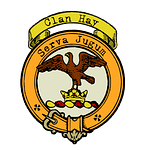Welcome back to "A Clan A Day Podcast," brought to you by bagtownclans.com! I'm your host, Colin MacDonald, and today we're diving into the fascinating history of Clan Dundas—a Lowland clan with deep roots in Scotland’s history and a legacy that spans centuries. From medieval charters to political intrigue, military heroics, and legal dynasties, the story of the Dundases offers a rich tapestry of Scottish heritage.
The name Dundas is derived from the Gaelic "Dun deas," meaning "south fort." This likely refers to the clan’s ancestral lands on the southern shores of the Firth of Forth, near modern-day Edinburgh. The Dundas family’s origins trace back to Helias, son of Uctred, son of Gospatrick, the Prince of Northumberland. Helias is thought to have acquired the lands of Dundas during the reign of Malcolm IV (1153–1165) or shortly thereafter, making the Dundases one of the oldest noble families in Scotland.
The first recorded mention of the family comes during the reign of William the Lion (1165–1214), when a Serle de Dundas appears on official documents. Later, both Serle de Dundas and Robert de Dundas are noted on the Ragman Rolls of 1296, swearing fealty to Edward I of England—a common practice at the time to secure lands under English rule, albeit reluctantly.
By the 15th century, Clan Dundas had firmly established its place in Scottish society. Sir Archibald Dundas, a favorite of James III, was entrusted with several important missions to England. Although James intended to elevate Sir Archibald further, the king’s untimely death left these plans unrealized. However, James IV granted the Dundases control over the island of Inchgarvie in the Firth of Forth, allowing them to construct a castle and further secure their influence in the region.
The Dundas family’s historic seat, Dundas Castle, built in 1424, remains a testament to their enduring legacy. Other prominent branches of the clan included Dundas of Blair Castle, Arniston, Duddingston, and Fingask, each contributing to the family's extensive influence across Scotland.
The Dundases were staunch supporters of Presbyterianism and played a key role during the Wars of the Covenant. George Dundas, the 18th Laird, commanded Linlithgowshire’s defenses against Oliver Cromwell. He was also part of the committee that tried the infamous James Graham, 1st Marquess of Montrose, who had been a Royalist supporter during the wars.
The Dundases of Arniston emerged as a distinguished cadet branch, known for their prominence in Scotland's legal and political arenas. Sir James Dundas, 1st of Arniston, served as Governor of Berwick under James VI and later represented Midlothian in the Scottish Parliament. A devout Presbyterian, he vehemently opposed the reintroduction of bishops to the Church of Scotland and was an early signatory of the National Covenant.
Despite his loyalty to the crown, Sir James’ firm religious convictions led to tensions during the Restoration period. Appointed as a judge in the Court of Session, he refused to declare the Covenant unlawful, which ultimately led to his resignation. His legacy as a defender of Presbyterian values remains a cornerstone of the clan’s identity.
The Dundases were deeply divided during the Jacobite risings. William Dundas of Kincavel, a member of the Blair Castle branch, fought for the Jacobites during the 1715 rebellion and was imprisoned for his role. However, the clan overall maintained a reputation for loyalty to the crown in subsequent years, with members serving in prominent political and military roles.
One of the most notable figures of Clan Dundas was Henry Dundas, 1st Viscount Melville, often referred to as the "Uncrowned King of Scotland." A key political ally of William Pitt the Younger, Henry wielded immense influence, serving as Lord Advocate, Secretary of State, and ultimately the first Viscount Melville in 1802. He played a pivotal role in lifting the ban on Highland dress after the Jacobite uprisings and restoring confiscated estates to former Jacobite families.
Henry’s legacy is commemorated in Edinburgh’s St. Andrew Square, where an imposing column and statue bear his name. Though a polarizing figure due to his centralization of power in Scotland, his impact on the nation’s political and cultural landscape is undeniable.
The Dundas family has also contributed significantly to Britain’s military history. Sir David Dundas served as Commander-in-Chief of the British Army in 1809, while Admiral Sir Charles Dundas of Dundas, the 28th clan chief, was an aide-de-camp to King George V and played a vital role during World War I.
The Dundas legacy continues today, with the current chief, David Duncan Dundas of Dundas, residing in South Africa. Despite their geographic dispersion, Clan Dundas maintains strong ties to its Scottish heritage through organizations like the Clan Dundas Society, which celebrates the family’s history and traditions.
From their origins as early landowners to their role as legal, military, and political leaders, Clan Dundas exemplifies resilience and adaptability. As the saying goes, "Any Prime Minister can raise a man to the House of Lords, but it takes seven centuries of Scottish history to make a Dundas of Dundas."
Thank you for joining us on this journey through the storied past of Clan Dundas. Be sure to tune in tomorrow for another episode of "A Clan A Day Podcast." Until then, I’m Colin MacDonald, reminding you to Essayez—Try! Go n-éirí an bóthar leat!













Share this post